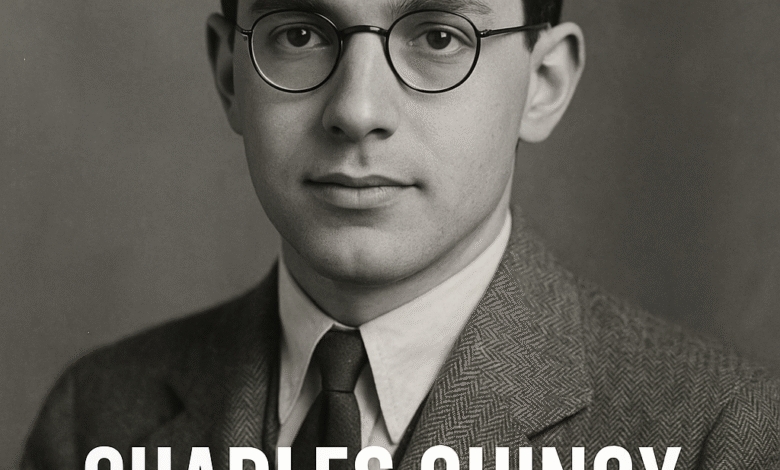Charles Quincy Ascher Einstein: A Unique Legacy Interwoven with History

When we hear the name “Einstein,” the first thought that usually comes to mind is Albert Einstein, the iconic physicist known for his groundbreaking theories on relativity and his contributions to the field of modern physics. Albert’s name has become synonymous with genius, intellectual achievement, and innovation. However, there are other individuals who share the Einstein surname, each with their own stories and contributions to their respective fields, including Charles Quincy Ascher Einstein. Although not as widely known as Albert, the connection between Charles and the Einstein legacy is one that sparks curiosity, prompting us to ask: Who is Charles Quincy Ascher Einstein, and how does his life contribute to the broader historical tapestry of the Einstein name?
In this article, we will explore the life and legacy of Charles Quincy Ascher Einstein, shedding light on his background, family history, and contributions. While his name might evoke thoughts of the famous physicist, Charles’ life story is his own, and it is a story worth understanding in the context of family legacies, intellectual pursuit, and personal growth.
Who Was Charles Quincy Ascher Einstein?
Charles Quincy Ascher Einstein is a figure whose name carries with it a great deal of historical weight. Born into a family with an undeniable connection to one of the greatest minds of the 20th century, Charles’ upbringing was marked by the influence of intellectual tradition. However, unlike Albert Einstein, who captured the world’s attention through his revolutionary theories and profound scientific insights, Charles Quincy Ascher Einstein’s contributions, while significant, have remained more subtle and private.
Charles’ life was undoubtedly shaped by the legacy of his famous relative. Growing up with the surname “Einstein” would have likely been both a blessing and a challenge. On one hand, it would have opened doors, given him access to intellectual circles, and perhaps even inspired a sense of responsibility to live up to the expectations set by Albert Einstein’s monumental achievements. On the other hand, living in the shadow of such a towering figure might have created a sense of pressure, with expectations that Charles could somehow follow in Albert’s footsteps.
Yet, despite the weight of the Einstein name, Charles Quincy Ascher Einstein is a person with a unique identity who, while influenced by his family history, carved out his own path. The details of his early life, education, and career are not as widely documented, but there are certain aspects of his character and contributions that emerge when considering his legacy.
The Family Connection to Albert Einstein
The link between Charles Quincy Ascher Einstein and Albert Einstein is an important aspect of understanding the context in which Charles lived and worked. Albert Einstein, born in 1879 in Ulm, Germany, revolutionized the world of physics with his theories on relativity and his contributions to quantum mechanics, which reshaped humanity’s understanding of the universe. His intellectual achievements earned him the Nobel Prize in Physics in 1921, and his name became synonymous with genius and groundbreaking thought.
While the specifics of Charles Quincy Ascher Einstein’s familial connection to Albert Einstein are not always clear, there is an undeniable thread that ties the two men together. Whether through direct descent or as a distant relative, Charles shared the same last name and, by extension, a historical legacy that carried with it a deep sense of intellectual prestige.
Having a family member like Albert Einstein would likely have instilled in Charles a deep appreciation for science and intellectual exploration. However, the expectations that came with sharing the Einstein surname could have been a source of both inspiration and pressure. For someone in Charles’ position, it would have been important to navigate the balance between honoring the family legacy and forging his own path in the world.
The Influence of the Einstein Legacy on Charles Quincy Ascher Einstein
The legacy of Albert Einstein is vast, extending beyond the confines of physics into philosophy, social justice, and education. Albert Einstein was not just a scientist; he was a social advocate, a thinker who cared deeply about the world around him. His stance on various issues—ranging from pacifism to his advocacy for civil rights—reveals a man who was deeply connected to the broader human experience. Growing up in a family that was influenced by such an intellectual giant, Charles Quincy Ascher Einstein would have been exposed to these ideas and ideals.
The question, then, becomes not just how Albert Einstein’s fame affected Charles, but also how the principles Albert championed might have shaped Charles’ worldview. Whether or not Charles made significant scientific discoveries of his own, his intellectual pursuits may have been shaped by the philosophical and moral ideas that Albert espoused. It is possible that Charles’ work, much like Albert’s, was driven by a desire to contribute to humanity’s greater good, even if the outcomes were not as widely recognized or celebrated.
Contributions of Charles Quincy Ascher Einstein
While Charles Quincy Ascher Einstein might not have achieved the same level of fame as Albert Einstein, it is important to note that his contributions to society and his field—whatever they may be—are valuable in their own right. It is often the case that individuals who come from prominent families feel the pressure to live up to the expectations set by their forebears, but Charles may have decided to focus on pursuits that were less public-facing, contributing in quieter, more private ways.
Perhaps Charles engaged in intellectual work or creative endeavors that didn’t garner widespread attention. His contributions might have been within academic, social, or cultural fields that did not result in mass recognition but still impacted those around him. The absence of large-scale public attention does not diminish the value of these contributions.
Another possibility is that Charles Quincy Ascher Einstein may have played a significant role in furthering his family’s intellectual legacy by mentoring others, fostering collaboration, and creating spaces for intellectual dialogue. Many influential people work behind the scenes, encouraging innovation and critical thinking in ways that are not always visible but still impactful.
The Einstein Legacy in the Modern Context
The significance of the Einstein name in the modern world cannot be overstated. Albert Einstein’s work continues to influence the fields of physics, mathematics, and technology today. His theories on relativity have had profound implications in areas ranging from cosmology to GPS technology, and his intellectual contributions continue to shape our understanding of the universe.
However, the legacy of the Einstein name also speaks to broader issues such as social justice, pacifism, and human rights. Albert Einstein was a vocal advocate for peace and a critic of the prevailing social and political conditions of his time. His influence extends far beyond the world of science, touching on social and philosophical matters that continue to resonate today.
For Charles Quincy Ascher Einstein, the modern context of the Einstein legacy is a unique challenge. While the world may not know his name as intimately as they know Albert’s, the values and ideals associated with the Einstein surname still provide a moral and intellectual framework. Whether or not Charles directly contributed to scientific research or made major public appearances, the values instilled in him by his family history likely played a significant role in shaping his worldview.
Reflections on Legacy and Individuality
Charles Quincy Ascher Einstein’s story is a reminder that legacies are not always defined by the loudest accomplishments or the most publicized achievements. Sometimes, legacy is about quietly living out the ideals and values that have been passed down through generations, contributing in subtle ways to the intellectual and cultural landscape of society.
For many people with famous or influential family names, there is a balance between honoring the past and creating one’s own future. Charles, though not as well-known as Albert, represents a different side of the Einstein legacy—one that emphasizes personal growth, intellectual curiosity, and the quiet pursuit of knowledge.
Ultimately, the legacy of Charles Quincy Ascher Einstein serves as a testament to the ways in which history, family, and personal identity intersect. While the world may not remember him for the same reasons it remembers Albert Einstein, Charles’ story is still an important part of the broader narrative of the Einstein family and its enduring influence.
Read also: Office AVStarnews: Pioneering the Future of Workplace AV Solutions
Conclusion
Charles Quincy Ascher Einstein may not be as famous as his relative, Albert Einstein, but his connection to the Einstein name and legacy is undeniable. His life reflects the complexities of living in the shadow of a towering intellectual figure while also carving out a personal identity. Through his contributions, whether seen or unseen, Charles embodies the quiet but enduring influence of the Einstein family—a legacy that is not defined by fame alone but by the values, ideas, and impact left on the world.



